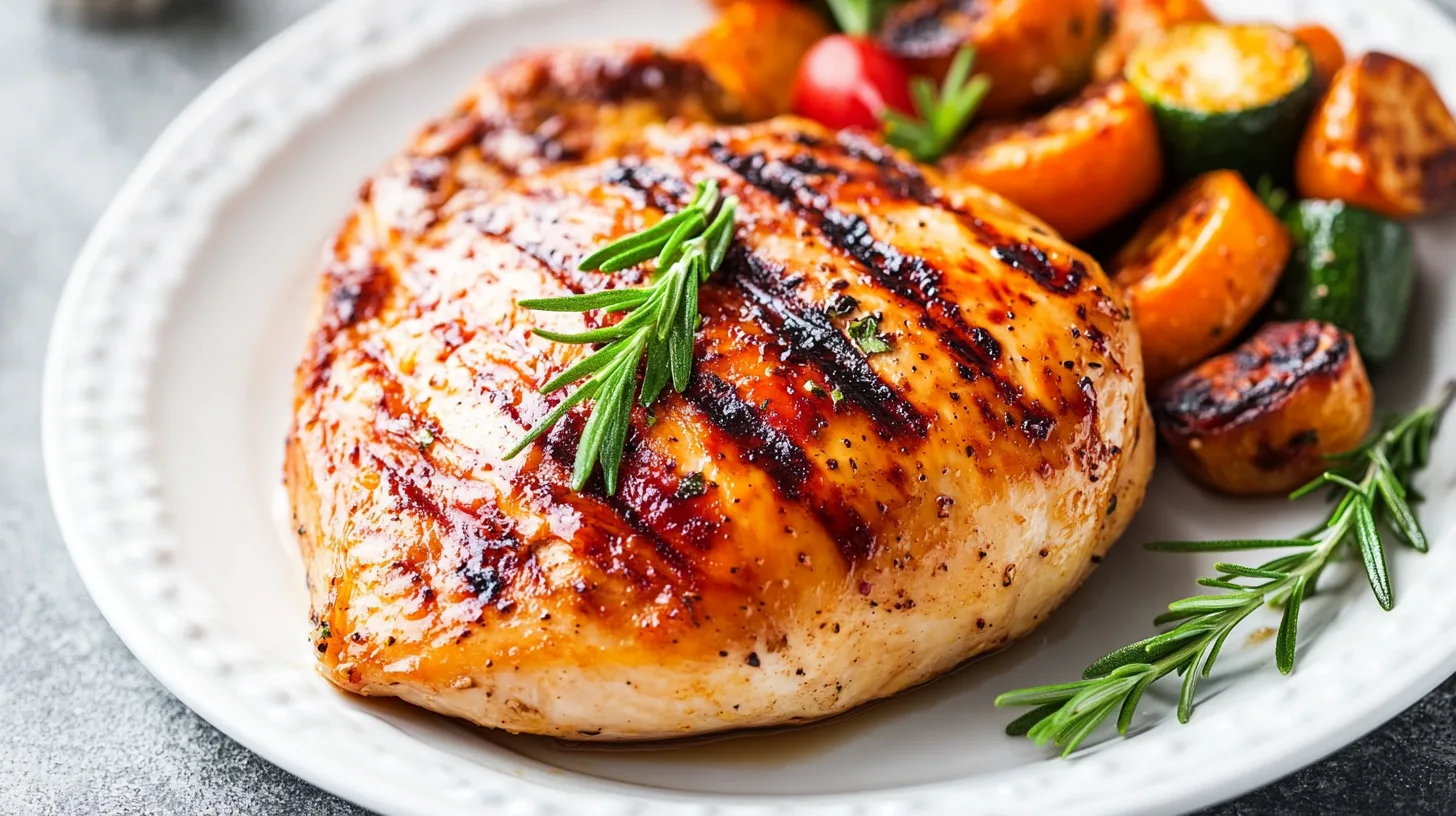Marinating chicken is like giving it a flavor spa day—it soaks up all the deliciousness, tenderizes, and comes out ready to impress. But here’s the million-dollar question: How long should you marinate chicken? Too little time, and it’s bland. Too much, and it’s a mushy mess. Don’t worry, though—I’ve got you covered. Let’s break it all down, step by step, so you can nail it every time.
Table of contents
Why Marinating Chicken Matters
Let’s start with the basics. Why bother marinating chicken in the first place? Well, it’s not just about making it taste good (though that’s a big part of it). Marinating does two key things:
- Adds Flavor: The marinade seeps into the chicken, infusing it with herbs, spices, and all the yummy stuff you’ve mixed in.
- Tenderizes the Meat: Certain ingredients in the marinade, like acids or enzymes, break down the proteins, making the chicken softer and juicier.
Think of it like this: marinating is the secret handshake between you and your chicken. It’s what turns a basic meal into something unforgettable.
The Science of Marinating Chicken
Okay, let’s get a little nerdy for a second. Marination works because of chemistry. Acids (like lemon juice or vinegar) and enzymes (found in ingredients like pineapple or papaya) break down the muscle fibers in the chicken. This not only tenderizes the meat but also opens it up to absorb more flavor.
But here’s the catch: too much of a good thing can backfire. Leave chicken in an acidic marinade for too long, and it can become mushy or even start to “cook” (thanks to the acid). That’s why timing is everything.
Key Benefits of Marinating Chicken
Aside from flavor and tenderness, marinating has a few other perks:
- Keeps Chicken Moist: No one likes dry chicken. A good marinade locks in moisture, especially if it has some oil in it.
- Adds Variety: You can switch up the flavors depending on your mood—think zesty lemon-herb, smoky BBQ, or spicy Asian-inspired.
- Makes Cooking Easier: When your chicken is prepped and flavorful, half the work is already done. Just throw it on the grill or in the oven, and you’re golden.

Factors That Influence Chicken Marination Time
Not all chicken is created equal, and neither are marinades. The time your chicken needs to marinate depends on a few key factors. Let’s break them down.
Type of Chicken Cut and Its Effect on Marination
The cut of chicken you’re using plays a huge role in how long it should marinate. Here’s a quick guide:
- Thin Cuts (like chicken breasts or cutlets): These don’t need much time—30 minutes to 2 hours is usually enough. They’re like sponges; they soak up flavor fast.
- Thicker Cuts (like thighs or drumsticks): These can handle longer marination times, anywhere from 2 to 8 hours. They’re like the slow-and-steady types—they take their time but deliver big flavor.
- Whole Chicken: If you’re marinating a whole bird, you’ll want to give it at least 4 to 6 hours, or even overnight. It’s a big job, but worth it.

The Role of Acidity in Chicken Marinades
The more acidic your marinade, the less time your chicken needs. Acids work fast, so if you’re using something like lemon juice, vinegar, or yogurt, you might only need 30 minutes to an hour. But if your marinade is more oil-based or has less acid, you can let it hang out longer.
How Chicken Thickness Affects Marinating Time
Thicker pieces of chicken need more time for the marinade to penetrate. If you’re working with a big, chunky breast, you might want to score it (make shallow cuts) to help the marinade get in there. Otherwise, the flavor might just hang out on the surface.
How Long Should You Marinate Chicken for Best Results?
Now, let’s get to the heart of the matter: How long should you marinate chicken? The answer depends on what you’re going for. Here’s a breakdown:
Quick Chicken Marinade (30 Minutes to 1 Hour)
If you’re short on time, a quick marinade can still do wonders. This works best for thin cuts or when you’re using a highly acidic marinade. The flavor won’t be as deep, but it’ll still taste great.
“A quick marinade is like a power nap for your chicken—it might not be a full night’s sleep, but it’ll still wake up refreshed.”
Standard Chicken Marination (2 to 4 Hours)
This is the sweet spot for most chicken cuts. It gives the marinade enough time to work its magic without overdoing it. Whether you’re grilling, baking, or frying, 2 to 4 hours will give you juicy, flavorful chicken.
Overnight Chicken Marinade (8 to 24 Hours)
Got time to spare? Let your chicken marinate overnight. This is ideal for thicker cuts or when you want maximum flavor. Just be careful with acidic marinades—too long, and your chicken might start to break down.
Is One Hour Enough for Marinating Chicken?
This is a common question, and the answer is: It depends. Let’s break it down.
When 1 Hour of Marination Works Best for Chicken
- Thin Cuts: Chicken breasts, cutlets, or tenderloins can get plenty of flavor in just an hour.
- Acidic Marinades: If your marinade has a lot of lemon juice, vinegar, or yogurt, an hour is usually enough.
- Quick Meals: When you’re in a rush, an hour is better than nothing. It’ll still taste better than unmarinated chicken.
Why You Might Need Longer Than 1 Hour to Marinate Chicken
- Thicker Cuts: Chicken thighs, drumsticks, or whole pieces need more time to absorb the flavor.
- Oil-Based Marinades: These take longer to penetrate the meat, so you might want to go for 2 to 4 hours.
- Complex Flavors: If your marinade has a lot of herbs, spices, or other ingredients, giving it more time lets those flavors meld together.
How to Tell If Chicken Has Been Marinated Too Long
Yes, there is such a thing as over-marinating. Here’s how to spot it.
Signs You’ve Over-Marinated Your Chicken
- Mushy Texture: If your chicken feels soft or slimy, it’s been in the marinade too long.
- Off Smell: Over-marinated chicken can start to smell sour or unpleasant.
- Discoloration: If the chicken looks grayish or has an odd color, it might be past its prime.
Texture and Flavor Changes in Over-Marinated Chicken
Over-marinating can turn your chicken into a texture nightmare. Instead of being tender and juicy, it can become mushy or mealy. The flavor might also become overpowering or unbalanced.
What Happens If You Marinate Chicken for Too Long?
Let’s dig a little deeper into the consequences of over-marinating.
Effects of Over-Marination on Chicken Texture
Acidic marinades, in particular, can break down the proteins in chicken too much, leaving it with a weird, almost “cooked” texture. It’s like the marinade starts to “eat” the chicken instead of flavoring it.
Flavor Impact of Marinating Chicken Too Long
Too much time in the marinade can make the chicken taste overly salty, sour, or just plain weird. It’s like adding too much seasoning—it overpowers everything else.
Common Problems and Solutions When Marinating Chicken
Even the best of us run into issues when marinating chicken. But don’t worry—most problems have simple fixes. Let’s tackle the most common ones.
Problem: Chicken Becomes Too Salty After Marination
Ever bitten into a piece of chicken that made you reach for a glass of water? Yeah, that’s over-salted chicken. It usually happens when the marinade has too much salt or soy sauce.
Solution: Adjust Marinade Ingredients
- Use low-sodium soy sauce or cut back on salt in your marinade.
- Balance the saltiness with something sweet (like honey) or acidic (like lemon juice).
- Rinse the chicken lightly before cooking to remove excess salt.
Problem: Chicken Turns Mushy During Marination
Mushy chicken is the worst. It’s usually caused by leaving the chicken in an acidic marinade for too long.
Solution: Limit Acidic Ingredients
- If your marinade has lemon juice, vinegar, or yogurt, don’t let the chicken sit for more than 2 hours (for thin cuts) or 4 hours (for thicker cuts).
- Use less acidic ingredients and add more oil or herbs for flavor instead.
Problem: Marinade Doesn’t Absorb Into the Chicken
Sometimes, no matter how long you marinate, the flavor just stays on the surface. This often happens with thicker cuts or when the marinade is too thick.
Solution: Score the Chicken or Use a Vacuum Seal
- Make shallow cuts (score) the chicken to help the marinade seep in.
- Use a vacuum-sealed bag to marinate—it helps the marinade penetrate deeper.
- Thin out your marinade with a bit of water or oil if it’s too thick.
Tips for Perfectly Marinated Chicken Every Time
Now that we’ve covered the problems, let’s talk about how to make your marinated chicken absolutely perfect. Here are some pro tips:
Choose the Right Container for Marinating Chicken
- Glass or Plastic: Always marinate in a non-reactive container (like glass or food-safe plastic). Metal can react with acidic ingredients and mess up the flavor.
- Ziplock Bags: These are great because you can squeeze out the air and make sure the chicken is fully coated. Plus, they’re easy to clean up!
Why You Should Keep Chicken Marinade Refrigerated
Never marinate chicken at room temperature. Bacteria love to grow in warm environments, so always keep your marinating chicken in the fridge. If you’re worried about the cold slowing down the marination process, just plan ahead and give it more time.
Avoid Reusing Marinade for Chicken
This is a big one. Once the marinade has touched raw chicken, it’s off-limits for anything else. If you want to use it as a sauce, set some aside before adding the chicken, or boil it thoroughly to kill any bacteria.
FAQs About Marinating Chicken
Let’s tackle those burning questions you might have about marinating chicken.
How Long Should Chicken Sit in Marinade?
The ideal marination time depends on the cut and the marinade. For thin cuts, 30 minutes to 2 hours is plenty. For thicker cuts, 2 to 8 hours works best. Overnight marination is great for whole chickens or large pieces, but avoid over-marinating with acidic ingredients.
Is 1 Hour Enough for Marinade?
Yes, 1 hour can be enough, especially for thin cuts or highly acidic marinades. However, thicker cuts or oil-based marinades might need more time to fully absorb the flavors.
How to Tell If Chicken Is Marinated Too Long?
Look for these signs:
- The chicken feels mushy or slimy.
- It has a sour or off smell.
- The color looks grayish or unnatural.
If you notice any of these, it’s probably been marinated too long.
What Happens If I Marinate My Chicken for Too Long?
Over-marinating can ruin the texture and flavor of your chicken. Acidic marinades can make it mushy, while salty marinades can make it overly salty. Always stick to the recommended marination times to avoid these issues.
Conclusion
Marinating chicken doesn’t have to be complicated. With the right timing, ingredients, and techniques, you can turn ordinary chicken into a flavor-packed masterpiece. Whether you’re grilling, baking, or frying, a good marinade can make all the difference.
Mastering Chicken Marination
Think of marinating as a skill—it takes a little practice, but once you’ve got it down, you’ll never look back. Experiment with different flavors, cuts, and marination times to find what works best for you.
Final Thoughts on Marinating Chicken for Optimal Results
- Plan Ahead: If you’re marinating overnight, make sure to account for the time.
- Balance Your Marinade: Use a mix of acid, oil, and seasonings for the best results.
- Don’t Overdo It: Remember, more time isn’t always better. Stick to the guidelines to avoid over-marinating.
“Marinating chicken is like a dance—you need the right rhythm and timing to make it perfect.”


1 thought on “How Long to Marinate Chicken in Marinade: A Complete Guide”